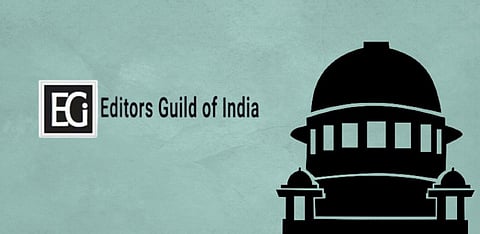

A Supreme Court Bench led by the Chief Justice of India Dr D.Y. Chandrachud contemplated transferring the petition to the Delhi High Court from the Manipur High Court.
—
TODAY, the Supreme Court extended interim protection from arrest by Manipur police to three journalists from the Editors Guild of India till September 15.
Two first information reports (FIR) have been filed in Manipur against the members of the fact-finding team belonging to the guild who had submitted a fact-finding report on violence-hit Manipur.
A three-judge Bench led by the Chief Justice of India (CJI) Dr D.Y. Chandrachud and also comprising Justices P.S. Narasimha and Manoj Misra considered transferring the petition seeking quashing of the FIRs to the Delhi High Court from the Manipur High Court.
On September 6, a Bench led by the Chief Justice of India (CJI) Dr D.Y. Chandrachud and also comprising Justices J.B. Pardiwala and Misra had granted interim protection to the journalists till today.
Senior advocate Shyam Divan, appearing on behalf of the journalists, had apprised the Bench that between August 7 and 10, the guild sent the petitioners— Seema Gupta, Sanjay Kapoor and Bharat Bhushan— to report on the issue of local and State media coverage in Manipur.
The report, dated September 2, alleges that the local media in Manipur have written one-sided reports and the bias in the coverage has worsened due to the internet ban in the state.
The report also claims that the "leadership of the state became partisan during the conflict".
Today, the Solicitor General of India Tushar Mehta submitted an affidavit pointing out that the appropriate forum for hearing the petition is the Manipur High Court. He stressed that the high court is now functional and lawyers are allowed to argue virtually.
Senior advocate Kapil Sibal, appearing on behalf of the petitioners, raised serious objections against the hearing of the matter by the Manipur High Court.
Sibal averred that the guild did not visit Manipur voluntarily but on the request or invitation of the Indian Army in a letter, dated July 12.
Sibal contended that the Indian Army had raised concerns on the unethical and ex parte reporting by local media in Manipur and asked for an objective assessment of the issue.
According to the report, a written complaint by Indian Army's Third Corps headquarters claimed that "the media outlets of Imphal Valley" may be "one of the major contributors to the instigation of further violence".
The report states that the team was constituted after receiving several representations on the alleged "uneven and biased reportage of the conflict".
Sibal insistently questioned the rationale for charging the petitioners under various provisions of the Indian Penal Code (IPC), such as Sections 500 (punishment for defamation), 505 (statements made in public mischief) and 298 (uttering words, etc. with deliberate intent to wound the religious feelings).
"How can I [the guild] be prosecuted for an objective assessment [of the issue]?" Sibal contended.
On the dangers in appearing before the Manipur High Court, Sibal pointed out that the house of a lawyer in Manipur was vandalised and some lawyers have also withdrawn from appearing before the Manipur High Court.
On September 6, senior advocate Anand Grover had apprised the Supreme Court of the threat to the lawyers representing Dr Kham Khan Suan Hausing, a professor of political science at the University of Hyderabad, in Manipur High Court.
The three advocates, engaged by Grover to represent Dr Hausing in the Manipur High Court, have withdrawn from the case due to alleged threats by members of their own (Meitei) community.
The house of one of the lawyers, Soraisham Chittaranjan, was vandalised by a mob.
Further, Sibal raised concerns that following the filing of the FIRs, on September 4, the Chief Minister of Manipur N. Biren Singh stated in a press conference that the Editors Guild of India had made provocative statements about Manipur.
To this, Mehta warned against the matter being projected as a national or political issue.
Subsequently, the CJI clarified that the Bench is not contemplating on whether the FIRs against the Editors Guild of India should be quashed, but whether the petition can be tried in the Delhi High Court.
The CJI observed that the guild has prepared a report, which may be a matter of their "subjective opinion". He questioned whether the report can be made a subject matter of an FIR.
"It is just a report after all," the CJI remarked.
Consequently, the Bench directed Mehta to take further instructions on the observations made by the court.
The matter is posted for hearing on September 15.